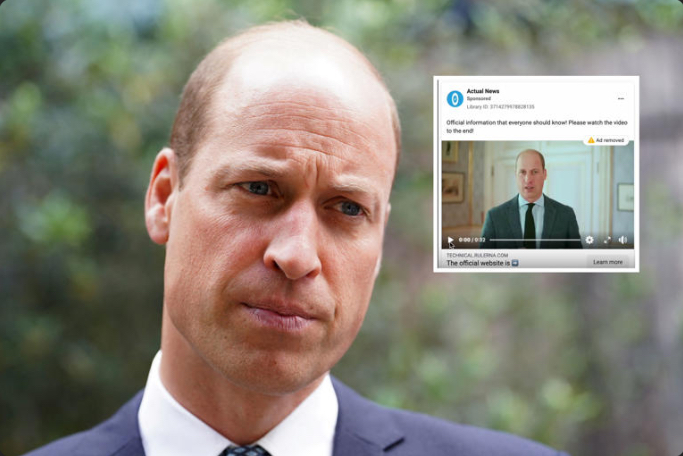The Prince of Wales and British Prime Minister Keir Starmer appeared in an ad campaign on Facebook seemingly giving their backing to “Immediate Edge.”
However, neither has ever actually done so and the videos that accompany the ads were in fact AI generated fakes designed to tempt people to contact financial scammers, according to research by media insight firm Fenimore Harper.
In one video, the AI generated William says: “Good afternoon, honored citizens of the United Kingdom.
“I am pleased to announce that I, Prince William, and the entire Royal Family fully support Prime Minister Keir Starmer’s initiative and his new platform.”
And in others, AI Starmer says: “Your life is about to change. I am Keir Starmer, prime minister of the United Kingdom and leader of the Labour Party. I have been waiting for you.
“Today is your lucky day. I don’t know how you found this page, but you won’t regret it.”
The ads promised to make anyone with a phone or computer £1,000 [around $1,300] a day and Meta, which owns Facebook, was paid £21,000 to host them.
Fenimore Harper used Meta’s own data to determine there were 259 disinformation adverts mentioning Starmer which reached 891,834 people and online reviews appear to indicate some of those who responded to the ads said they lost their money.
Marcus Beard, founder of Fenimore Harper, told the palace may be reluctant to take action against either the scammers or Meta for now but may be forced to respond in the years to come as AI fakes proliferate.
“I think it’s on everyone, certainly the Government, and public figures who are affected by this practice of deep fakes—and who aren’t affected but easily could be—to put pressure on Meta and put pressure on the social media platforms,” he said.
“What I can see right now with the palace is that Prince William featured in not a majority of the adverts, the majority of them were about Keir Starmer.
“The danger that there is with responding to this information in this way is you signal boost it and it may be they just don’t want eyeballs on it.
“It maybe highlights the fact their images can be ripped and used so easily. So I can see why they’re hesitant but give it a year and it may be unavoidable in terms of how the royals just seem to generate loads of traffic across the board for websites.
“You can see them becoming a target. You can see that currently it’s not quite big enough for them to do anything but I think everyone in the public image space needs to be putting pressure on Meta and the platforms about this problem in general.
“If this is left undealt with by the platforms and the moderation is left in exactly the same place they’re going to have to do something because the ads—there’s only going to be more of them—and they’re getting better and more malicious.”
A report by Fenimore Harper said those who click on the advert are asked to submit their name, email address and phone number and it adds: “After they enter these details, they are contacted and encouraged to make deposits into a fake online trading platform.
“Scammers typically show a fake portfolio making great gains, encouraging victims to deposit more. When the victims request to withdraw their funds, the scammers disappear and the victims never see their money again.
“‘Immediate Edge’ has over 55 negative reviews of Trustpilot, mostly from victims complaining they lost their money or were hounded by scammers over the phone. Some reviewers still appear to believe that Prime Minister Keir Starmer has endorsed the platform.”
A spokesperson for Meta said “Our systems detected and removed the vast majority of these adverts before this report was published.
“As part of our ads review process—which can include both automated and human reviews—we have several layers of analysis and detection, both before and after an ad goes live.
“It is against our policies to run ads that improperly use images of public or political figures for deceptive purposes, and we remove these ads when detected.”
A Google spokesperson said: “Our advanced spam-fighting systems help keep Google Search 99 percent spam free, despite ever-evolving attempts from spammers. We have clear spam policies against deceptive tactics and when we find behavior that violates our policies, we take action.”

